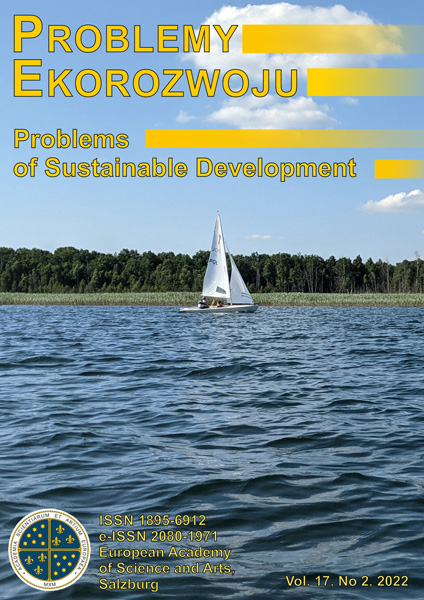ACCA, 2020, Covid-19 Having Significant Impact on the World’s Auditors, https://www.accaglobal.com/gb/en/news/2020/april/ACCA-Covid-19-Research-Audit.html (02.02.2022).
ALEKSYSHYN V., MYKHALCHUK H., 2019, Method of Ranking Objects to Search by Keywords in a Decentralized Network, Current Problems of Automation and Information Technology, 23: 78-89.
DOI: https://doi.org/10.15421/431909
BAHATSKA K., HEIDOR A., 2019, Business PROCEsses in the CONTExt of DIgitalization of the Economy, KTUTE Bulletin, 5: 23-32.
DOI: https://doi.org/10.31617/visnik.knute.2019(127)03
BAKER, M., 2014, Digital Transformation. South Carolina, CreateSpace Independent Publishing Platform.
BOIKO, V., 2019, Advantages and Disadvantages of Using Decentralized Payment Systems as an Innovative Method of Cross-Border Settlements, Investments: Practice and Experience, 8: 75-82.
DOI: https://doi.org/10.32702/2306-6814.2019.8.75
BRITCHENKO I., SAIENKO V., 2017, The Perception Movement Economy of Ukraine to Business, Ikonomicheski Izsledvania, 26(4): 163-181.
BUTYNETS F., IVAHNENKOV T., DAVYDIUK T., SHAKHRAICHUK T., 2002, Accounting Information Systems. Zhytomyr, Ruta.
FEDORENKO A., 2019, Actual Aspects of Ukraine's Transition to a Decentralized System of Enforcement Proceedings, Modern Issues of Economics and Law, 1: 296-305.
GULIYEVA A., BRITCHENKO I., RZAYEVA U., 2018, Global Security and Economic Asymmetry: A Comparison of Developed and Developing Countries, Journal of Security and Sustainability Issues, 7(4): 707-717.
DOI: https://doi.org/10.9770/jssi.2018.7.4(8)
HORBACHUK V., LYASHKO A., 2019, The Issue of Decentralized Consensus of Blockchains, Market Infrastructure, 34: 325-332.
DOI: https://doi.org/10.32843/infrastruct34-47
HOROSHKOVA L., VOLKOV V., KARBIVNYCHYI I., 2018, Financial Levers as Mechanisms for Managing Decentralized Resources, Theoretical and Practical Aspects of Economics and Intellectual Property, 17: 106-116.
DOI: https://doi.org/10.31498/2225-6407.17.2018.158882
IVANCHENKOVA L., SKLIAR L., PAVELKO O., CHEBAN Y., KUZMENKO H., ZINKEVYCH A., 2019, Improving Accounting and Analysis of Innovative Costs, International Journal of Innovative Technology and Exploring Engineering, 9(1): 4003-4009.
DOI: https://doi.org/10.35940/ijitee.A5253.119119
KESSEL P., 2018, Is Cybersecurity More Than Protection? https://www.ey.com/uk_ua/advisory/global-informationsecurity-survey-2018-2019 (26.01.2022).
KHARCHENKO M., 2017, Centralized and Decentralized Accounting in Budgetary Institutions: Advantages And Disadvantages, Economy and State, 7: 24-27.
KHODAKIVSKYI YE., YAKOBCHUK V., ZAKHARINA O., PLOTNIKOV M., IVANIUK O., 2019, Formation of the European Q-management System in Decentralized Communities, Scientific Horizons, 3: 10-18.
DOI: https://doi.org/10.33249/2663-2144-2019-76-3-10-18
KOVAL V., OLCZAK P., VDOVENKO N., BOIKO O., MATUSZEWSKA D., MIKHNO I., 2021, Ecosystem of Environmentally Sustainable Municipal Infrastructure in Ukraine, Sustainability, 13(18):10223. https://www.mdpi.com/2071-1050/13/18/10223 (02.02.22).
DOI: https://doi.org/10.3390/su131810223
KOZLOVSKYI S., BUTYRSKYI A., POLIAKOV B., BOBKOVA A., LAVROV R., IVANYUTA N., 2019,
Management and Comprehensive Assessment of the Probability of Bankruptcy of Ukrainian Enterprises Based on the Methods of Fuzzy Sets Theory, Problems and Perspectives in Management, 17(3): 370-381, https://doi.org/10.21511/ppm.17(3).2019.30.
DOI: https://doi.org/10.21511/ppm.17(3).2019.30
KURBATOV O., KRAVCHENKO P., POLUYANENKO O., SHAPOVAL O., KUZNETSOVA T., 2019, Decentralized System of Identification and Certification, Cybersecurity: Education, Science, Technology, 2:19-31.
DOI: https://doi.org/10.28925/2663-4023.2019.6.1931
LAZAREVA M., 2018, Transaction Costs and Synergy Effects in Modern Corporations. Economic Annals – ХХІ, 171:23-28.
DOI: https://doi.org/10.21003/ea.V171-04
MIKELSONE E., ATSTAJA D., KOVAL V., UVAROVA I., MAVLUTOVA I., KUZMINA J., 2021, Exploring Sustainable Urban Transformation Concepts for Economic Development, Estudios de Economia Aplicada, 39(5). http://ojs.ual.es/ojs/index.php/eea/article/view/5209 (18.01.2022).
DOI: https://doi.org/10.25115/eea.v39i5.5209
NARIBAEV K., 1983, Finance and Statistics, Organization and Methodology of Accounting in Terms of ACS, 1: 135.
NAZAROVA K., MYSIUK V., GORDOPOLOV V., KOVAL V., DANILEVIČIENĖ I., 2020, Preventional Audit: Implementation of SOX Control to Prevent Fraud, Business: Theory and Practice, 21(1): 293-301.
DOI: https://doi.org/10.3846/btp.2020.11647
OLIYNYK V., ZHURAVKA F., BOLGAR T., YEVTUSHENKO O., 2017, Optimal Control of Continuous Life Insurance Model, Investment Management and Financial Innovations, 14(4): 21-29.
DOI: https://doi.org/10.21511/imfi.14(4).2017.03
POPITICH T., 2010, Economic Analysis, Prerequisites for the Rational Organization of Accounting in Consumer Cooperation, 6: 303-305.
PWС, 2020, 23rd Annual Global CEO Survey: Navigating the Rising Tide of Uncertainty, https://www.pwc.com/gx/en/ceo-survey/2020/reports/pwc-23rd-global-ceo-survey.pdf (26.01.2022).
SIDHU H., 2019, Is Digital Audit Communication an Opportunity We Don't Notice?, https://www.ey.com/uk_ua/digitalaudit/connectivity-audit-overlooked-opportunity (02.02.2022).
STRILETS V., PROKOPENKO O., ORLOV V., 2020, Impact of Covid-19 on the Budget Security of the National Economy: a Forecast for Ukraine, Public and Municipal Finance, 9(1): 25-33.
DOI: https://doi.org/10.21511/pmf.09(1).2020.03
TRACHENKO L., LAZORENKO L., MASLENNIKOV Y.E., HRINCHENKO YU., ARSAWAN I.W.E., KOVAL V., 2021, Optimization Modeling of Business Processes of Engineering Service Enterprises in the National Economy, Naukovyi Visnyk Natsionalnoho Hirnychoho Universytetu, 4: 165-171.
DOI: https://doi.org/10.33271/nvngu/2021-4/165
TUGUI A., GHEORGHE A.-M., 2016, Identifying Difficulties Encountered by the Accounting Profession in Accessing Documents, in the Digital Economy Context of Romania, Audit Financiar, 3: 291-301.
DOI: https://doi.org/10.20869/AUDITF/2016/135/291
WILLIAMS M., MURO J., TURNER B., MARSHALL C., 2020, Best Accounting Software in 2020: Free and Paid Versions to Manage Accounts, https://www.techradar.com/best/best-accounting-software#1-zipbooks (26.01.2022).
YAROSHENKO O. M., MOSKALENKO O. V., SLIUSAR A. M., VAPNYARCHUK N. M., 2018, Commercial Secret as an Object of Labour Relations: Foreign and International Experience, Journal of Legal, Ethical and Regulatory Issues, 21(Special Issue 1), https://www.abacademies.org/articles/commercial-secret-as-an-object-of-labour-relations-foreignand-international-experience-7853.html (18.01.2022).
ZHYVETS A., 2018, Evolution of Professional Competencies of Accountants of Small Enterprises in the Digital Economy of Ukraine, Baltic Journal of Economic Studies, 5: 87-93.
DOI: https://doi.org/10.30525/2256-0742/2018-4-5-87-93







